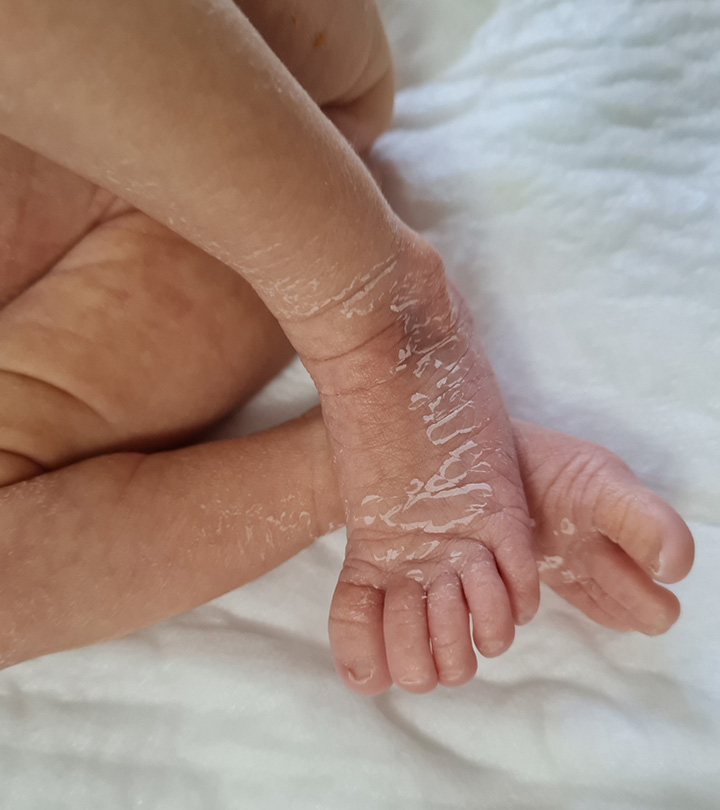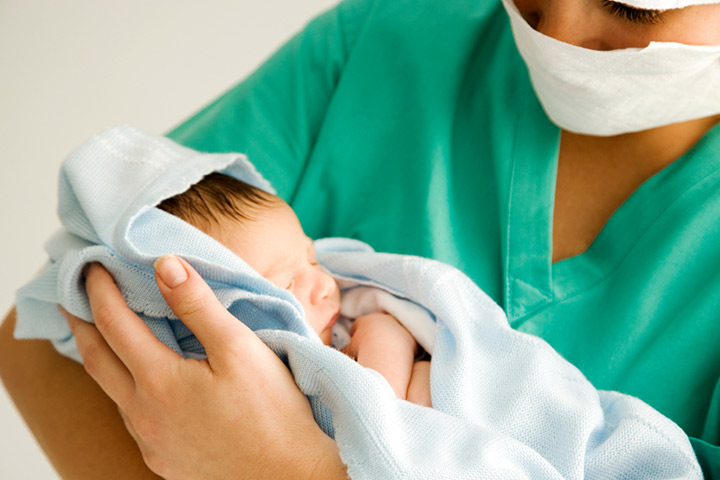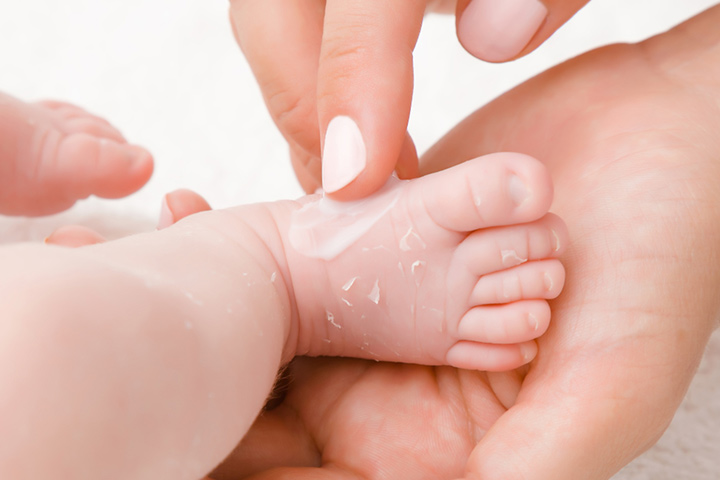Newborn skin peeling is common and not always a cause for concern. The extremely sensitive skin of newborns goes through several changes in appearance and texture in the first few weeks after birth. In addition, many babies have dry patches of skin, which may lead to skin peeling or flaking. However, it is normal in most cases and does not require special care.
Nevertheless, if skin peeling is severe or persistent, medical treatment may be needed to resolve the issue. Read this post to learn about the causes and treatment for skin peeling in newborns.
Is It Normal For A Newborn To Have Peeling Skin?
In most cases, skin peeling in newborns is normal. Newborns’ delicate skin is susceptible to dryness, causing the top-most layer to flake off in the first few weeks post-birth. However, several external factors can cause irritability and rashes due to their skin’s delicate nature. Further, most of the time, the issue resolves on its own (1).
What Are The Causes Of Newborn Skin Peeling?
The following are some factors that cause baby skin peeling:
- Vernix caseosa: This thick, waxy coating protects the baby from the amniotic fluid inside the womb. Losing this outer layer may cause natural skin peeling in the first few weeks of birth (2).
- Full-term birth: The skin of newborns differs according to the time of birth. Premature babies (born before 37 weeks) usually have less skin peeling. A full-term baby’s skin is thicker, and their skin may lighten a few days post-birth and become dry and flaky (3).
- Eczema: Eczema is characterized by a dry rash on the face, elbows, and knees. It is an allergic skin condition which causes itching that may lead to skin peeling (4). Eczema is rare in newborns and does not usually develop until a baby is closer to four to six months of age.Infants born in a family with a history of eczema may be susceptible to cradle cap, a harmless skin condition characterized by yellow scaly patches on the scalp.
- Ichthyosis: A rare condition due to genetic mutations where the dead skin becomes extremely dry and flaky and peels when rubbed (5).
- Psoriasis: An autoimmune disease that occurs due to excessive skin inflammation, leading to the rapid shedding of skin cells. A study by multiple institutions states that about one percent of children are affected by psoriasis, with one-third of the cases beginning in the pediatric years. However, it is rare for infants to be affected by it (6).Diaper rash is another common skin condition that can cause skin peeling in newborns and older babies. It is often characterized by redness in the region, fussiness, skin blistering, open sores, and scaling.
When Does Newborn Skin Stop Peeling?
There is no defined time frame by when a newborn’s skin may stop peeling. However, if your baby’s skin shows no signs of improvement in two weeks, you could contact your pediatrician (7).
What Are The Treatments And Remedies For Skin Peeling In Newborns?
The following are some ways to treat skin peeling in newborns (7) (8):
- Moisturizer:A hypoallergenic moisturizer, selected depending on the severity of dryness, can help restore the skin’s moisture and reduce cracking and peeling. Apply it right after bath time for maximum effectiveness.
Some parents may opt for oils like olive oil to alleviate skin dryness and minimize skin peeling in newborns.
Emily Inman, a mother to two, shares how massaging her newborns with olive oil helped her manage their skin peeling issues. She says, “It (baby massage) was most useful with them (her children) as newborns, especially when their skin got quite dry after birth and would peel like a sunburn. Both our kids had dry skin, so we found ourselves routinely rubbing olive oil over them to help moisturize their skin. We were told to use olive oil by the midwife at the time instead of branded and perfumed oils (i).”
- Short bathing time: Keep the baby’s bath time to under ten minutes and avoid daily baths if possible. Newborn babies only need to be bathed once or twice a week as sponge baths are sufficient. Since hot baths can cause further dryness, use room temperature or slightly warm water (9).
- Avoid using soap: Do not use soap too often as it strips the skin’s natural oils, causing excessive dryness. Baby soaps and body washes are milder but shouldn’t be used daily.
- Keep the room humid: Dry air may further aggravate irritation and cause heat rashes. Maintain the humidity in the baby’s room by running a cool-mist humidifier.
- Cotton clothing: Dress the baby in clothes made from cotton or natural fabrics. Cotton is preferred as it is soft and allows the skin to breathe, keeping it healthy and comfortably covered.
Newborn skin peeling is a natural consequence of pregnancy that causes the newborn to lose its outer skin layer. However, a newborn’s skin may also peel off due to specific skin issues, such as eczema, ichthyosis, and psoriasis. Generally, newborn skin peeling reduces significantly or stops within two weeks after birth. However, if the peeling persists or worsens, consult a pediatrician promptly. In most cases, newborn skin peeling can be managed using simple home remedies, such as applying a hypoallergenic moisturizer on the baby’s skin and keeping the bathtime short.
Key Pointers
- Skin dryness may cause skin peeling in babies in the first few weeks.
- Using a hypoallergenic moisturizer and keeping the room humid could help manage the condition.
- If there is no visible improvement in two weeks, you could consult a pediatrician.














